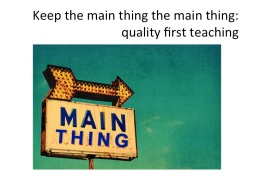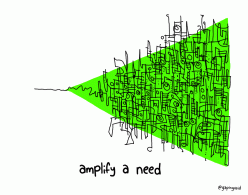‘Garry was brilliant,’ …. ‘He told us exactly where the Italians were and he really motivated us with things like: ‘If not now, when? If not you, who? How much do you want this?’ We knew then that we wanted it more than them.’ (Greg Searle, Gold, Barcelona Olympics)
In the Barcelona Olympics the Searle brothers trailed the Italians by two lengths at 1250m…with 15 stokes remaining it was still more than a length…rising to the if not now, when? and the if not you, who? challenge…the brothers showed extraordinary courage and determination to overhaul the Italians in the last stroke to win Gold. (Click picture to view the race)
It is probably true that when it comes to raising achievement (RA) a “whatever it takes” mindset and culture is key and Term 4/5 is the engine room of opportunity to ensure that students perform. Where there is a focus on quality first teaching and a balance of being deliberate, precise and rigorous on strategies and approaches that matter… there are no limits to what can be achieved.
This begs the question: How do Academies/schools raise achievement most effectively ahead of summer exams? After all, “If not now, when?” … “If not you, who?”
“Success is not a random act. It arises out of a predictable and powerful set of circumstances and opportunities.” (Malcolm Gladwell)
What if we always kept central that it is quality first teaching that matters? – what students receive every lesson, every day is what raises achievement and this is best achieved through strong, precise and deliberate teaching over time. – This is the “flywheel” (Collins), the “One Thing” (Keller). Keep the main thing, the main thing…
What if we also understood that RA approaches have much to inform us about everyday teaching, assessment and practices? So that RA is not about a sticking plaster or a bolt-on (panic) approach, but is built into effective progress-focussed teaching across all Year groups.
What if we realised that urgency is important when raising achievement and that it is crucial that this is communicated to encourage and insist on a move to action for both students and staff? We need to “amplify a need” to secure action that makes the difference.
What if it was the superheroes in our midst that led RA – each teacher, tutor, mentor, leader taking responsibility for RA and believing that anything is possible and being the change and impetus to move students to action? …the deliberate action that enables students to achieve. Blog: Connected Collaboration and Deliberate Altruism
What if we are very clear about who is responsible for student performance? Class-level responsibility is key to RA – teachers being accountable for students – where there is quality conversation (support and challenge) around what can be achieved with a group of students – teaching becomes more focused on RA.
What if we reward teaching that is outcome-orientated? We value and reward teachers who achieve progress over time; placing more weight on outcomes and progress achieved than performance in observations. And what if we support and reward teaching that is more deliberate and grounded in formative assessment, so that it enables planning to close gaps and secure greater progress. (blog: progress over time)
What if we show a boldness of leadership that reshuffles students, alters groupings and changes staffing to ensure students get the best opportunity to perform? (they only get one shot) And What if where behaviour limits progress teachers and leaders are tenacious and quick to remove this barrier?
What if we fully recognised that Raising Achievement is not about doing more and stacking strategy on strategy … in the push to raise achievement… “not everything matters equally?” (Keller) see Strategic leadership | fanatical discipline and deliberate delivery. We should deliberately seek “marginal gains” (David Brailsford) but resist the temptation just to add strategy on top of strategy – such approaches are high energy, spread impact thinly and are often counter productive.
What if we embedded deliberate practice within teaching and RA? Deliberate Practice occurs when students…
1. …are be motivated and exert effort to improve their performance.
2. …engage in tasks that take into account their pre-existing knowledge.
3. …receive immediate informative feedback and knowledge of the results of their performance.
4. …repeatedly perform the same or similar tasks.
What if based on sound formative and summative assessment that allowed a deep understanding of what students are able to do and not do we used DTT and DDI to close gaps in understanding?…
- DTT – Diagnosis, Therapy, Test, Diagnosis, Therapy, Test….
- DDI – Data Driven Instruction.
What if using DDI allows for greater professional conversation around how to secure concepts with students? Why are there gaps shared by students in their understanding? If we focus on understanding how effective our instruction is then teaching will more quickly RA of students.
What if, like the Oakland As, RA is consistently Data Driven? If we ask the right questions and measure the most important performance indicators (the gaps) we get a sense of impact/performance and we direct teaching, planning and intervention to efficiently and effectively close gaps. See blog: Greatness isn’t born, it’s grown.  What if we borrow and use more of Dan Coyle’s ideas on learning and performance? He identifies three important conditions that support learning:
What if we borrow and use more of Dan Coyle’s ideas on learning and performance? He identifies three important conditions that support learning:
- Maximise reachfulness in the presence of an expert
- Embrace the struggle – “You will become clever through your mistakes.”
- Encourage theft – use feedback and copy others.
Dan Coyle: http://www.youtube.com/watch?v=Aq0pHpNy6bs (17 mins)
What if RA is based on the assumption that anyone can learn anything? That the physical development of myelin to secure pathways in the brain enables learning – it is practice that counts and that Dweck’s Growth Mindset ideas are central to highlighting what is possible?
“We all have the ability to profoundly change our levels of talent, our level of skill. Where clusters of great talent emerge there has been a culture created where individuals are constantly reaching and repeating, making mistakes, receiving feedback, building better brains, faster more fluent brains…inside the brain myelin acts like insulation on the pathways and connections in the brain – each time we reach and repeat we earn another layer – signal speeds in the brain start to increase from 2 mph to 200 mph – neuro broadband – (or the difference between normal and great).” (Dan Coyle)
What if Mock exams were regular and deliberately delivered, perhaps in this sequence? Quality teaching…Walking Talking Mock…Visualisation/deliberate instruction/preparation…Mock Exam…question-level feedback…moderation…diagnosis…DDI/DDT…deliberate results day…quality first teaching/intervention that precisely closes gaps.
What if these Mocks are externally marked or moderated? such that a accurate “Actual Performance” is measured? …completed in exam halls, under full exam conditions, with full exam papers? …including all access arrangements?
What if Mock performance precisely informed what is taught and better still how it is taught (DDI)? What if Covey tables or similar identified specifically the gaps and opportunities for marks and that this is owned in subjects and at class-level? (remembering that some marks are easier than others)
What if fine grading was used across all subjects and that the criteria for each fine grade is consistently applied? And what if feedback from each exam provided question-level analysis and specifically directed students to when and how they can close gaps in understanding?
What if parents evenings were also results evenings where students receive results and specific question/area-level feedback on what is known and where the gaps…and how, where and when the gaps can/will be closed?
What if we meticulously had a plan for the seconds, minutes, hours and days prior to am and pm exams – that this tapered preparations, supported students and was consistent, dependable and reassuringly routine?
What if the period before and during the exams was precisely timetabled to make the very best use of the time available, such that quality teaching input existed up to each exam and that lessons and teachers whose courses had completed made an Academy contribution to support the preparation for other exams?
What if we also focused on student well-being, praise and reward? Cohort performance is often linked to cohort ethos and approach, such that there is a collective and wide-held value placed on performing and achieving? This can often be tangible and obvious – where cohorts tip outcomes improve. What approaches can be used to create a sense of belonging, a Year group sense of we are in this together and “your success is also my success?”
What if RA is a whole Academy drive such that a 100 day plan (to… 50 day plans) leading up to and through the summer exams is owned by all? And even better if this is translated into subject plans…that are very specific, deliberate and precise. What if there is a clear focus on the key students that make the difference the “key 34” the “critical 25” the “golden 28”?
Maybe then we would exploit a “whatever it takes” and “if not now, when” mindset that assumes everything is possible and ensures students perform and achieve. That we never let up on improving the quality of teaching as this is the most effective way of raising student achievement of students – what happens in every lesson really matters.
Maybe also we would be precise and deliberate about Raising Achievement, squeezing out the most from the strategies and approaches that matter the most.
…enabling students to perform unusually well.
March 2015






Pingback: If Not Now, When? By @TeacherToolkit | @TeacherToolkit
Pingback: Education Panorama (April ’14) by @TeacherToolkit | @TeacherToolkit
Pingback: If Not Now, When? Raising Achievement | Blogs of the Month
Pingback: Raising achievement | OasisCoulsdonCPD